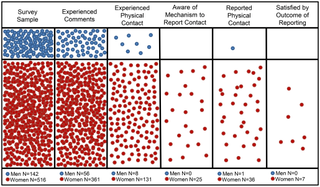
We Need to Talk About the Sexual Abuse of Scientists

This article was originally published at The Conversation. The publication contributed the article to Live Science's Expert Voices: Op-Ed & Insights.
The life sciences have come under fire recently with a study published in PLOS ONE that investigated the level of sexual harassment and sexual assault of trainees in academic fieldwork environments.
The study found 71% of women and 41% of men respondents experienced sexual harassment, while 26% of women and 6% of men reported experiencing sexual assault. The research team also found that within the hierarchy of academic field sites surveyed, the majority of incidents were perpetrated by peers and supervisors.
As a rape survivor, I speak from a place of support for victims of sexual assault and harassment.
In an age where more young people, women in particular, are the target of social media campaigns after their rape and sexual assault (see the incidents at Steubenville and Houston in the US alone), this support work becomes critical.
The shocking figures on sexual assault
A number of other highly publicised cases of sexual violence and murder of women led to a study to determine the true extent of such abuse.
The results, published in the medical journal The Lancet in February this year, estimated 12% of women had experienced non-partner sexual violence in Western Europe (Switzerland, Spain, Isle of Man, Sweden, UK, Denmark, Finland, Germany), as well as 13% of women in the US and Canada and 16% of women in Australia and New Zealand.
Sign up for the Live Science daily newsletter now
Get the world’s most fascinating discoveries delivered straight to your inbox.
A common theme in many cases of sexual assault is that the abusers are known to the people, and are usually in positions of power or trust. Yet a culture of silence allows the abuse to continue with the abusers unchallenged.
In the words of Thomas Meagher, the husband of the late Jill Meagher who was raped and murdered by a stranger in Melbourne:
The more I felt the incredible support from the community, the more difficult it was to ignore the silent majority whose tormentors are not monsters lurking on busy streets, but their friends, acquaintances, husbands, lovers, brothers and fathers.
That’s why the prevalence of harassment from within the research community reported by the PLOS ONE study is particularly alarming.
Scientists rely heavily on their supervisors for recommendations and career advancement. Our peers also become an important part of our professional network for grant reviewing and research collaborations.
I have been fortunate to have excellent mentors, both men and women scientists, who have been supportive of my personal and professional development and my passion to speak publicly as a rape survivor.
The need for policies to deal with sexual assault
Other scientists have been the victim of some form of sexual assault or harassment by their peers or supervisors. The support of institutionalised policies that specifically deal with such abuse would provide access to the appropriate reporting strategies and a wealth of resources to help them heal.
Although not explicitly stated as one of the tenets of the Athena SWAN Charter in the UK, the idea of a policy condemning and creating ramifications for sexual assault and harassment fits in with their stated goals of advancing women’s careers and employment in higher education and research in science, technology, engineering, maths and medicine (STEMM).
As I recommended recently in the scientific journal Nature, a sexual assault and sexual harassment policy for research institutes would be immensely useful.
In this way, a statement could be made in line with existing policy frameworks for academic, industry and government laboratories. But to honestly reflect the reality that men and members of the transgender community are also both researchers and rape survivors, the policy needs to be inclusive across the board.
As an early-career researcher myself, I was particularly disappointed at the prevalence of sexual assault and harassment by supervisors reported in the PLOS ONE study. I was also saddened by the subsequent lack of satisfaction with outcomes among those who reported the harassment.

Many early career researchers are on short-term contracts (of three, six or 12 months) that need to be reviewed by their supervisors. A move to more long-term funding schemes for such researchers could help relieve the pressure of asking a harassing supervisor or peer for recommendations, or having to explain why a reference is not made available on new job applications.
Reducing our dependence on the gospel of the student-supervisor relationship would be good for researchers who have experienced this type of sexual assault or harassment from their supervisor or peers.
Learn from others overseas
For those who are interested in creating a policy on abuse but are unsure of where to start, there are many resources available online.
In the US, the White House has put together a task force against sexual assault in higher education institutions. It has published a Guide to Drafting a Sexual Assault Policy that is widely applicable, complete with a handy checklist.
Our colleagues in the humanities have already developed several such policies as part of a larger professional ethics statement, including the American Philosophical Association’s Statement on Sexual Harassment and the Modern Language Association’s Statement of Professional Ethics.
Proactive strategies targeting sexual assault and sexual harassment can prevent interference with the core work of researchers — to discover new knowledge and translate this for the benefit of the community.
Each research organisation can draft a sensible, comprehensive equity policy that condemns sexual assault, sexual harassment and discrimination based on race, gender or sexual orientation.
This provides clear repercussions for students and faculty who transgress the policy. It also provides a mechanism for the consistent application of those repercussions (such as an impartial ombudsperson or trained adjudication committee).
With guidelines in place, we could make great strides towards ensuring all scientists – whether in the lab or the field – feel safe and valued.
1800 RESPECT (1800 737 732) is the National Sexual Assault, Family & Domestic Violence Counselling Line for any Australian who has experienced, or is at risk of, family and domestic violence and/or sexual assault, and Lifeline (131 114) provides national crisis support. Both operate 24 hours a day, 7 days a week.
Maggie Hardy will be on hand for an Author Q&A session between 11am and noon today (September 8). Post any questions to her in the comments below.
Margaret C. Hardy does not work for, consult to, own shares in or receive funding from any company or organisation that would benefit from this article, and has no relevant affiliations.
This article was originally published on The Conversation. Read the original article. Follow all of the Expert Voices issues and debates — and become part of the discussion — on Facebook, Twitter and Google +. The views expressed are those of the author and do not necessarily reflect the views of the publisher. This version of the article was originally published on Live Science.
Most Popular

